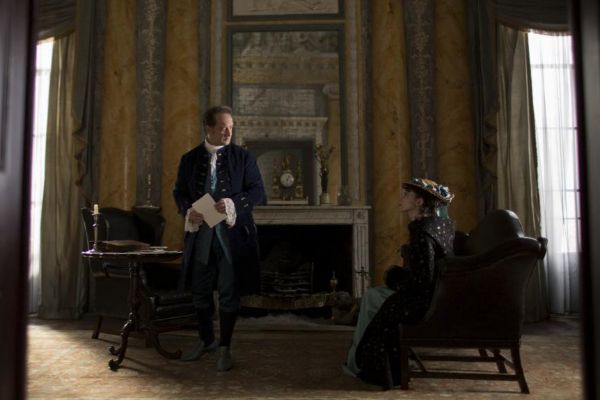Just in the last moments of Casanova, his last love , the one who was a writer, diplomat, violinist, secret agent, mathematician, scammer, inventor and, above all, adventurer is questioned by his visitor about the perhaps secret relationship between pain, the suffering, and love A fundamentally old man speaks to whom only memories remain as distant witnesses of a life that long ago, only in the past, dreamed eternally. Should we suffer to really love? "To love, maybe not, but to know that you have loved, no doubt," he says. The answer cannot be further from the libertine's ideology. There is no trace of the man who wrote in his memoirs: «These are the pleasures of life! But I can no longer procure anything other than the pleasure of continuing to enjoy them with the memory. And to think that there are monsters that preach repentance, and foolish philosophers who argue that pleasures are nothing but vanity! ». The Casanova who interprets from the heterodoxy Vincent Lindon suddenly discovers that he is an injured man and chained without remedy to what he most desires. Freedom condemns him. And it is there, in that strange and virtuous turn where the Frenchman Benoît Jacquot locates and punctuates his contrahedonist rereading, let's say so, of myth.
"The image we have of Casanova is paradoxical," reflects the director with a filmography literally obsessed by women (remember Eva, Diary of a waitress, Goodbye to the Queen or Villa Amalia ). "We have of him," he continues, "the image of a seductive, cheerful, essentially frivolous man. When someone is successful with women we say that he is a Casanova. And, shortly after a little research, that is only part of the portrait. His memories have always been one of my favorite readings. They are written, despite being Italian, in a French as free as his own life and also show a vulnerable man, always at the height of luck. He was neither a rich nor noble man and he spent his life trying to be both. That is the part that interests me: its fragility. And, honestly, I think that is the characteristic that moves him away from myth and brings him closer to us ».
The film is narrated in two times. Which allows the director to somehow imitate the uses and customs of biographies necessarily invented both from memory and from oblivion. On the one hand, the lover tells what happened to him a long time ago and left him completely surprised and helpless. On the other, there is a detailed reconstruction of that momentous love affair. In London, the Venetian meets the most famous of the prostitutes, Marianne de Charpillon, who gives life to Stacy Martin. You can own it like so many others. But she runs away. You will only access your claims if you meet a condition: the moment you stop wanting it, only then, will your most intimate wish be finally fulfilled. Casanova does not know, does not understand anything, but it is that insurmountable paradox that defines a new search or adventure that he did not even know until then that it was possible. "You could say that the film rests on the anachronism that the discovery of romantic love in the eighteenth century," says Jacquot. And, indeed, that is what it is about.
Casanova, the director insists, is neither Don Juan nor the Marquis de Sade. The first is a predatory craving that the Italian lacks. He is not infected by theology or Catholicism, he is not behind either revenge or conquest through lust. «He is part of the masculine half of humanity and what excites him is the other half, the feminine. The way to access it is complicity, affectivity, friendship and, of course, erotic intimacy. That is why I cannot share the reading Fellini made of his countryman, ”says Jacquot. Casanova understands freedom as a teenage fervor, by hedonistic force, who knows neither limit nor offense or even moral. It is debauchery by self-excitement rather than by the overpowering of the other. And this is what puts him at a distance from the other celebrity among the libertines. "Sade," the filmmaker continues, "spent most of his life in prison, while Casanova did not. Both wanted opulence and in it they comforted. But the marquis used that opulence to find all kinds of pretexts that would lead him to jail. Casanova is first and foremost an adventurer, Sade no. Casanova, who even devised the National Lottery, was seduced by the unknown aware that only luck matters. And so.
In short, the story of the most rigorous lover of freedom ends with the recognition of his slavery. When he loves he doesn't know, but when he remembers he once loved. "We do not realize very well of happiness or unhappiness at the moment it catches us, only to remember it," says the director. Is Casanova, perhaps, a feminist hero? "Without a doubt, the first one, and the recognition of his failure in old age is also part of the recognition of the failure of all of us," Jacquot says, perhaps determined to be Casanova himself.
According to the criteria of The Trust Project
Know more- cinema
- culture
The Sphere of PapelLuis López Carrasco: "The vote for Vox in Murcia has a lot of fatigue, protest, anger and punishment"
The final interview Los Compadres: "Only with laughter can the tension of being Spanish be overcome"
Goya Awards 2020 The Film Academy apologizes to its members for "deficiencies and errors" of organization in the Goya

